Mengding: Yunnan's Only Sub-County-Level Town Exudes International Flair Without Going Abroad!
Mengding, meaning "a plateau that can play musical instruments" in the Dai language, is a town renowned as the "Golden Gateway and Tender Dai Homeland." Not only is it Yunnan's sole sub-county-level town, but it also offers a touch of international charm without the need to cross borders, painting a distinctive cosmopolitan picture on the China-Myanmar border.
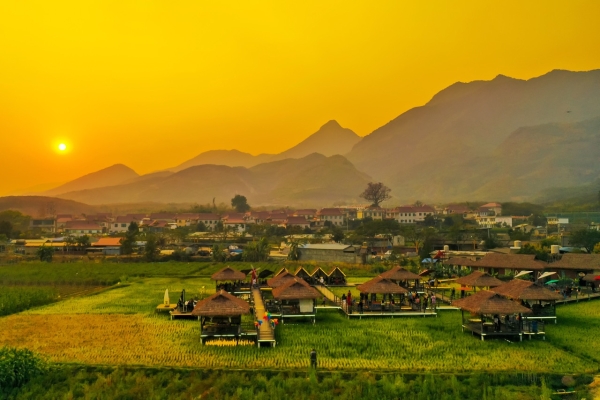
Mengding Daoxiangyuan Specialty Snack Shop. Photo taken by Peng Xiaohua.
The connectivity of its transportation arteries has made Mengding's "international coordinates" increasingly clear.
With the opening of the Lincang–Qingshuihe Expressway, the travel time from Lincang to the Qingshuihe Port has been reduced from 4 hours to just 1.5 hours.
As a Class I national port of entry, Qingshuihe Port is China's most convenient land route to Myanmar's Kyaukpyu Port, providing direct access to the Indian Ocean. From here, it's 748 kilometers to Naypyidaw, 983 kilometers to Kyaukpyu Port, and 1138 kilometers to Yangon.
As the construction of the new China-Myanmar Indian Ocean corridor progresses, Mengding's role as a hub for sea-rail intermodal transport continues to grow, fueling the vitality of its port economy.
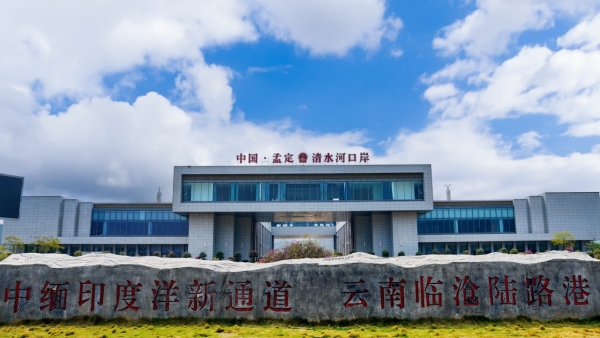
Mengding Qingshuihe Port.
Step into the Qingshuihe International Duty-Free GO Experience Hall, and you'll find Belarusian snacks, Spanish ham, Vietnamese coffee, and Myanmar handicrafts displayed alongside local dried beef and rice noodles – a harmonious fusion of flavors from different nations. Beside them, the bustling border residents' mutual trade zone at the Mengding Qingshuihe Port is alive with chatter in multiple languages, lighting up the unique lively atmosphere of the border area.
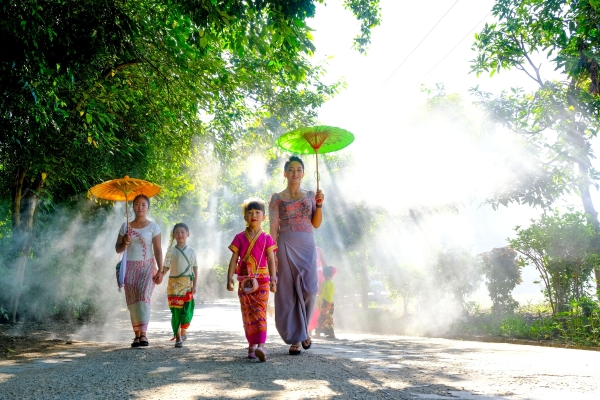
Some Dai "Bushao" (young women) take a walk in Mangtuan Natural Village. Photo taken by Gong Zhengxin.
Mengding's "international flair" is also woven into the flow of its produce. By six or seven in the morning, fresh vegetables brimming with dew are already for departure and can appear on supermarket shelves in cities like Chengdu, Beijing, and Shanghai within 48 hours, gracing countless dining tables.
Benefiting from the monsoon climate near the Tropic of Cancer, the region enjoys abundant sunshine and frost-free winters year-round. In 2024, Mengding exported over 400,000 tons of vegetables. This "South-to-North Vegetable Transportation" artery has dispelled the old notion of "winter storage" in the north, allowing fertile lands to yield high-value produce.
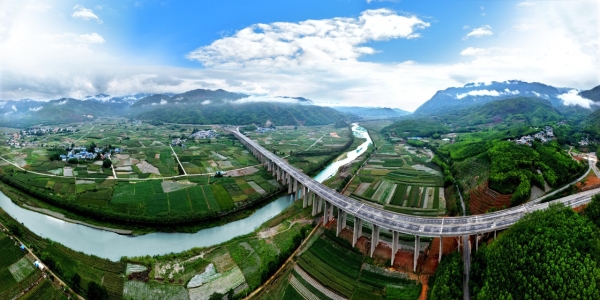
Mengjian section of the expressway interchange. Photo taken by Fu Lizhi.
The depth of its culture also forms the bedrock of Mengding's international character.
Mangtuan Natural Village in Zheha Community, Mengding Town, is hailed as the "First Village of Chinese Dai Papermaking." Its 600-year-old Dai papercraft is one of the most primitive papermaking techniques still in existence in China.
In the courtyards, white cotton paper is transformed into exquisite Dai cultural paper-cuttings in the skilled hands of intangible cultural heritage inheritors. On the public square, rows of Dai paper are naturally air-dried in the sunlight.
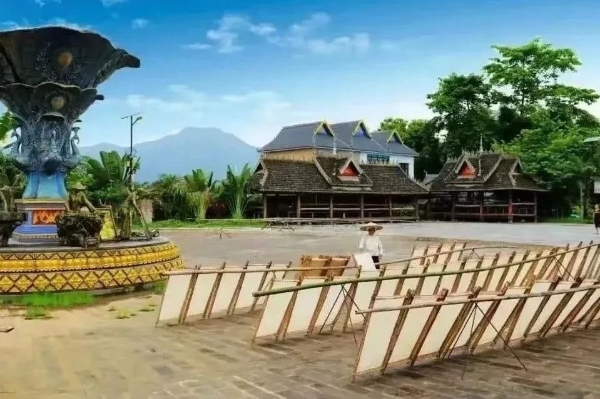
Villagers in Mangtuan Natural Village are drying white cotton paper.
This village is a microcosm of Mengding's multi-ethnic integration.
Twenty-three ethnic groups, including Dai, Han, Wa, Jingpo, and De'ang, reside here, blending the distinctiveness of various ethnic traditions with the charm of Han culture.
You can experience the elegant charm of bamboo houses at the Nanting Painting Academy, listen to ancient relic legends at the Dongjing Buddhist Monastery, or take a boat trip on the Nanting River and watch the sunset paint the clear waters. Alternatively, you can don De'ang ethnic attire and unlock the spirited "Deer Dance" in Mangkeng Natural Village, or marvel at the natural wonder of "a single tree forming a forest" in Banxing Village.
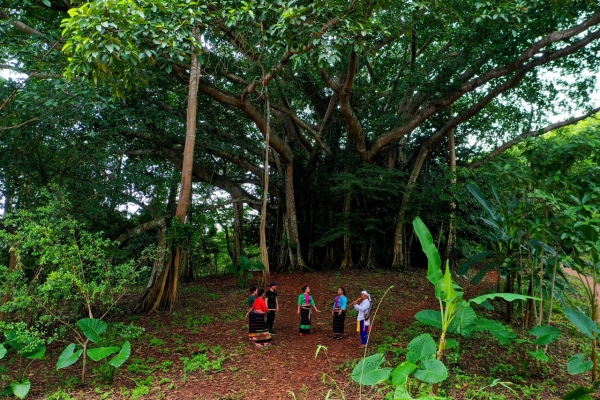
A single tree forming a forest in Banxing Dawantang, Mengding. Photo taken by Zi Yanjun.
Mengding becomes even more vibrant at night. At the Nanting River night market alongside China-Myanmar Street, Dai-style barbecues are paired with Laotian coffee. The coconut aroma of Pao Ludá blends with the crispness of Burmese dried bread, while the refreshing tang of Thai green lime water and the sour spiciness of Sapie rice noodles paint a vivid portrait of border-town life amidst dazzling lights.
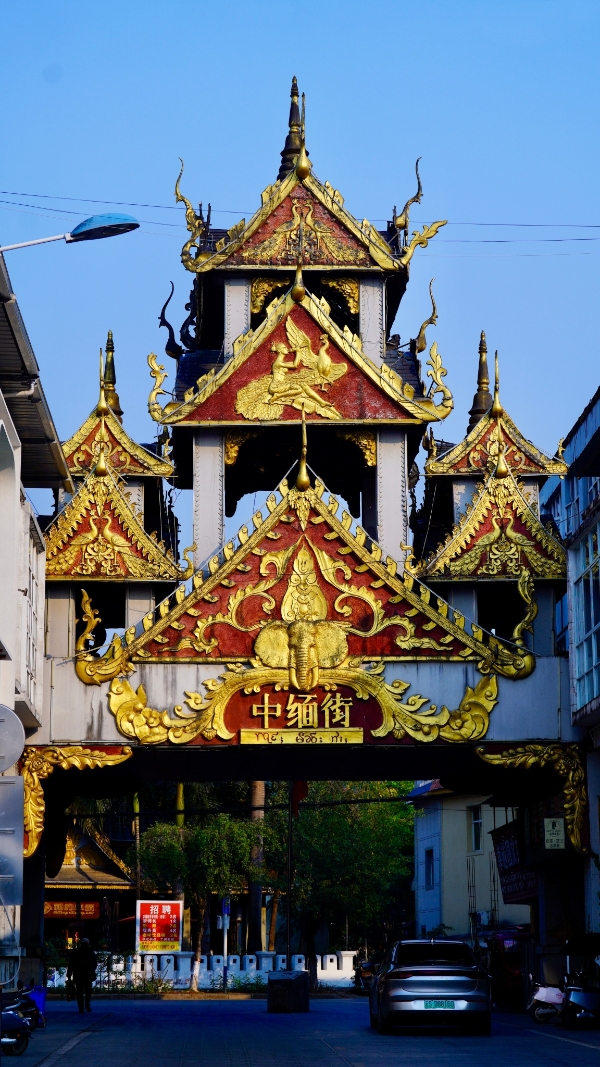
China-Myanmar Street.
From port trade to cultural exchange, from product circulation to daily life, Mengding gracefully integrates "international flair" into its daily rhythm.
The phrase "Yōulì Jīnwàng" (a Dai phrase meaning "delicious and good to live here") encapsulates the unpretentious yet open hospitality of this border town – a place that holds the expectations of the world.
Click here to view the Chinese report
(Editors: Jennifer, Alice)